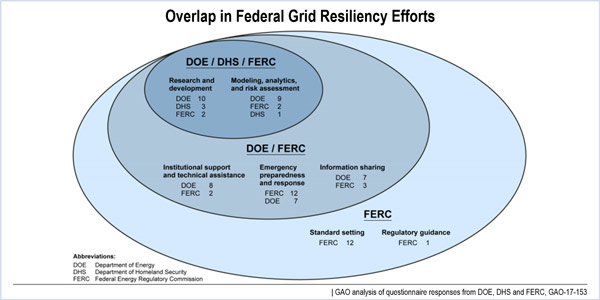By Wayne Barber
The U.S. Government Accountability Office said last week it is satisfied that federal agencies are collaborating with each other on grid resilience and not duplicating efforts.
A GAO report released Friday, “Electricity: Federal Efforts to Enhance Grid Resilience,” notes that the federal government has launched more than two dozen efforts and spent nearly a quarter billion dollars between 2013 and 2015 to improve the grid’s ability to withstand everything from hurricanes and geomagnetic disturbances to physical and cyberattacks.
The Department of Energy, the Department of Homeland Security and FERC reported implementing 27 grid resiliency efforts since 2013.
The efforts addressed three federal priorities: developing and deploying tools to enhance awareness of potential disruptions; planning and exercising coordinated responses to disruptive events; and ensuring actionable intelligence on threats is quickly communicated between government and industry.
GAO concluded that the grid reliance efforts are not being pursued in silos and are stressing collaboration between federal agencies as well as states and private industry stakeholders. In researching the report, GAO not only surveyed federal officials, but also representatives of the Edison Electric Institute, American Public Power Association and National Rural Electric Cooperative Association, whose members own most of the grid.
“We have previously reported that fragmentation has the potential to result in duplication of resources,” GAO said. “For example, fragmentation can lead to technical or administrative functions being managed separately by individual agencies, when these functions could be shared among programs. However, we also have reported that fragmentation, by itself, is not an indication that unnecessary duplication of efforts or activities exists.”
GAO auditors did not find any instances of duplication among the 27 federal grid resiliency efforts. “None of the efforts had the same goals or engaged in the same activities,” GAO said.
Of the 27 efforts, 12 were related to FERC’s role in reviewing and approving mandatory NERC reliability standards. Cyberattacks were considered in 15 of the 27 programs, while physical attacks and natural disasters were addressed in 12. Operational accidents were analyzed in only five of the programs, GAO found. Federal funding for DOE and DHS grid resiliency activities from fiscal year 2013 through fiscal year 2015 totaled approximately $240 million.
Efforts Have Sparked Progress
Federal grid efforts have sped the development of new technologies and improved coordination and information sharing between the federal government and industry related to potential cyberattacks, GAO said. It cited Homeland Security’s Resilient Electric Grid program, which developed a new superconductor cable that can connect several urban substations, mitigating disruptions by enabling multiple paths for electricity to flow if a single substation loses power.
Three DOE and DHS efforts addressed resiliency issues related to large, high-power transformers, but the goals were distinct. One effort focused on developing a rapidly deployable transformer to use in the event of multiple large, high-power transformer failures; another focused on developing next-generation transformer components with more resilient features; and a third focused on developing a plan for a national transformer reserve.
Homeland Security and Energy officials identified the Electricity Subsector Coordinating Council, an industry group, and the Energy Sector Government Coordinating Council as key mechanisms that help coordinate grid resiliency efforts. (See States Want Cyber Best Practices; Santorum Seeks ‘Warriors’.)
The GAO study was dated Jan. 25 and was initially presented to Rep. Don Beyer (D-Va.), the ranking member on the Oversight Subcommittee of the House Committee on Science, Space and Technology.




